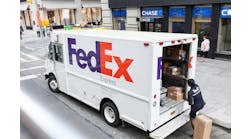Rio Ammunition supplies its products to law enforcement, sporting clubs and pro shops worldwide. Although based in McEwen, Tenn., it also ships to many customers out of its Savannah, Ga., location. Those are transportation lanes that are currently bustling with trucks serving the needs of food wholesalers and retailers, as well. During produce season, Rio competes for that shipping capacity with companies relying on trucks to drive down into Florida to pick up produce and come out fully loaded.
See Also: Transportation & Distribution Logistics News & Analysis
"Starting in April and running through the summer the trucks out of Savannah tend to get scarce and expensive because of produce," explains Andy Street, transportation manager for Rio. That's a difficult situation for a shipper that's used to more predictable transportation costs the rest of the year.
"Before, I would send an email to a couple brokers, then make a couple phone calls to find out what the rate was on a lane," he says. "We were bidding out lanes because they were repetitive, and those carriers were honoring it with a fuel surcharge plus or minus based on fuel. We knew what our freight rates were because we moved from a variable cost to a fixed cost with fuel being the variable."
Desire for Paper Cuts
Paper is another variable cost when it comes to shipping. It is produced via multiple processes supporting invoicing and payments. Street used to be a sales rep for a freight brokerage company so he has a good understanding of what it takes to find carriers and arrange for cost effective shipments. He also understands the costs of managing the paperwork accompanying this job, so he looked into finding a paperless alternative. He found his alternative by taking his business to an online brokerage.
He describes the service he selected, Buytruckload.com, as "shipping for dummies." It guides the shipper through all the details that would be easy for an inexperienced shipper to miss, such as "Do you need a lift gate?" or "Is this shipment a hazmat?" Then it builds the load in the system and makes it evident for the shipper so there are no surprises later on.
The Challenges Online
Sean Devine, co-owner of this online brokerage, knew there would be risks in trying to offer such a tool for freight brokerage.
"It's like speech recognition for a computer," he explains. "If it isn't that good then it's really terrible. Will it let you build loads that have weird transit times or that pick up too soon, or that have appointments that are too difficult for a given rate and need more money? Will it put multi-stop loads in order or will it think you can run multi-stop partial—all these details that someone who's been in the business understands. We've found it's important that the system understands that stuff just as well or better than the average broker so it doesn't allow customers to get into weird situations that they'll either not like or that we'll have to explain away."
Devine and his partner, John Labrie, spent much of last year teaching their system all the broker's tricks about what's reasonable and what's not, and for things that are reasonable, what requires additional cost and what doesn't.
Take, for example, transit times on short-haul truckload.
"In most cases where the carrier picks up and the delivery time is such that the truck can only go 150 miles a day, that's a problem you have to charge for because you're tying up this asset," Devine explains. "Whereas short-haul that picks up on Friday can deliver on Monday without extra fees because the short-haul truckload networks are based on five-day-week work schedules, not like the long-haul carriers."
John Labrie agrees that there are many mysteries associated with truckload pricing and they always tie back to operational realities and the impact a shipment will have on driver and equipment utilization for the carrier. But he believes brokers and carriers don't do a very good job in most instances of explaining those details to the customer. That means price can vary radically shipment to shipment, even in the same lanes based on the pickup and delivery day.
"Buytruckload.com will make those nuances of how they impact price obvious to the customer," Labrie says. "Our aim is to give the client some power they don't typically have in making decisions around things—like when the shipment moves—by simply giving them better information."
Rio Savings
Going online and paperless proved to be a good efficiency move for Street.
"Being able to pay online with a credit card helped us go paperless," he says. "I'm putting in all the information they need and it immediately goes on their board when I hit ‘book.' They can then email an invoice, I go online, hit pay and it's done."
Street tracks his shipping costs as a percentage of total sales, and he calculates that in the first full month of going the book-it-yourself route he saved $16,000. But he also realizes an intangible savings in time.
"I don't have to make a call to see if they have a truck or to see if delivery was made," he says. "Their system automatically emails me every time something changes—truck booked, truck leaves—so time savings is the biggest benefit."
These benefits will be even more critical this year with the sensitive subject of gun control being debated in Washington. Street says this uncertainty about gun and ammunition availability has caused a spike in his business.
"We're probably more than double in business compared to a normal year," he says. "We'll need more trucks than we've ever needed and it will be tighter than ever. They'll have to work for the capacity because we'll need twice as many trucks and it was already tough before [when competing for capacity with the Florida growers,] so we'll see what happens."






